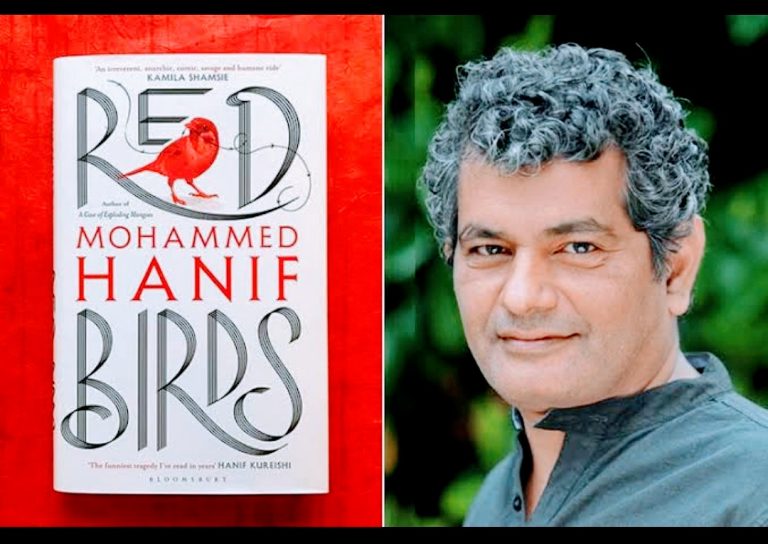
The book consists of nine stories that revolve around the lives of ordinary people living in Pakistan.
Reviewed by Shoukat Lohar
Introduction
Mohammed Hanif is a renowned Pakistani writer and journalist. He was born in Okara, Pakistan, in 1964. Hanif began his career in Pakistan Air Force and later worked as a journalist. He is best known for his debut novel, “A Case of Exploding Mangoes,” published in 2008 and became a bestseller.
The book was long-listed for the Man Booker Prize and won several other literary awards. Hanif’s writing is characterized by a satirical and irreverent style that often critiques the political and social realities of Pakistan. In this essay, we will provide a detailed summary and analysis of his novel “Red Bird” along with some excerpts from the book.
Summary
“Red Bird” is a collection of short stories by Mohammed Hanif. The book consists of nine stories that revolve around the lives of ordinary people living in Pakistan. The stories are set in different parts of the country and explore various themes such as love, loss, betrayal, and the absurdity of life.
The first story in the collection, “The Red Bird,” is about a young boy named Nida who discovers a red bird in his garden. The bird becomes a source of fascination and wonder for Nida, and he spends hours observing its behavior. However, his joy is short-lived as his mother tells him that the bird is a bad omen and must be killed. Nida struggles to save the bird but fails, and it eventually dies. The story is a poignant reflection on the cruelty of life and the loss of innocence.
The second story, “Butterfly,” is about a young girl named Shabnam who is forced to marry an older man against her will. Shabnam rebels against her fate and refuses to accept her husband, but eventually, she realizes that she has no other choice.
The story is a powerful commentary on the oppression of women in Pakistani society.
In the third story, “A Spoiled Man,” a wealthy businessman named Raja Sahib becomes obsessed with a young girl named Shama. He uses his power and influence to try and win her over, but she rejects him.
Raja Sahib becomes increasingly desperate and resorts to violence, which ultimately leads to his downfall.
The story is a scathing critique of the corrupt and abusive behavior of the Pakistani elite.
The fourth story, “Indian Tango,” is about a man named Jamil who is hired by the Pakistani government to train a group of young dancers for a cultural exchange program with India.
Jamil falls in love with one of the dancers, but their relationship is threatened by the political tensions between the two countries.
The story is a poignant exploration of the human cost of political conflict.
“The Ghost of 1971,” is the fifth story about a young woman named Salma who is haunted by the memories of the Bangladesh Liberation War.
Salma’s father was a Pakistani soldier who was killed during the war, and she struggles to come to terms with his death and her own identity as a Pakistani. The story is a powerful meditation on the trauma of war and the complexities of national identity.
The sixth story, “The Baloch Sniper,” is about a young Baloch man named Aftab who becomes a sniper for a militant group fighting for Baloch independence. Aftab is torn between his loyalty to the cause and his love for his wife and child. The story is a powerful exploration of the human cost of political violence.
The seventh story, “Our Lady of Paris,” is about a group of Pakistani pilgrims who travel to France to see the Notre Dame Cathedral. The group includes a young woman named Farida who is forced to confront her own prejudices and assumptions about the Western world. The story is a humorous
Here are some striking lines/excerpts from the novel Red Bird:
“The bird looked at him with its beady eye and flapped its wings, as if to say: ‘Look, I can fly!’ But Nida knew that it wasn’t just a bird. It was a messenger from another world.”
“Shabnam felt like a caged bird. She had been trapped by her parents, her family, and her society. She wanted to fly away, to be free, but there was nowhere to go.”
“Raja Sahib was like a spoiled child who had never been told ‘no.’ He had everything he wanted, except for the one thing he couldn’t have.”
“Jamil felt like he was living in a dream. He had never been to India before, but it felt familiar to him, like a place he had always known.”
“Salma couldn’t forget the smell of burnt flesh, the sound of gunfire, and the screams of dying people. She couldn’t forget the way her father had looked at her before he died.”
“Aftab felt like he was in a different world. He was no longer just a farmer or a husband or a father. He was a warrior, fighting for his people’s freedom.”
“Farida looked at the people around her and realized that they were just like her. They were human beings, with their own dreams, hopes, and fears. She felt a connection to them that she had never felt before.”
These lines/excerpts give a sense of the themes and emotions that run through the stories in “Red Bird.” They showcase Hanif’s skill at capturing the complexity of human experience and his ability to weave together humor, tragedy, and social commentary.
________________
 Shoukat Lohar is Assistant Professor in English at Mehran University of Engineering and Technology Jamshoro. He can be accessed at Shoukat.ali@faculty.muet.edu.pk
Shoukat Lohar is Assistant Professor in English at Mehran University of Engineering and Technology Jamshoro. He can be accessed at Shoukat.ali@faculty.muet.edu.pk